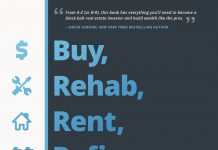I’m often asked by new or inexperienced investors if I take loans out on my investment properties. To those unfamiliar with how a mortgage works, it may seem better not to have one at all. The question of whether to take out a mortgage or not is one that is answered differently by different people, depending on their goals or strategy. In this post, we will examine the pros of cons of taking out a loan (using other people’s money as a form of leverage) and how to use it to supercharge your investing results.
What Leverage Means
When we talk about leverage, we are talking about using a house as collateral to obtain a loan. This is most often done at the time of purchase. A bank approves us for a loan amount based on the value of the house we want to purchase-the bank pays a portion of that amount (the loan value), and we pay the rest (the down payment). The vast majority of home owners obtain home loans this way, but it’s not the only way to do it. Homes can be purchased with cash and loans taken out later. No matter when it’s done, using leverage changes the game when purchasing a house.
Leverage, by nature, increases the potential gains and the potential loss. When a home is purchased for a good price, a good loan can allow the purchases to keep more of their own money in the bank. Most home buyers do not have the cash sitting in the bank to buy a property outright. On the same token, if a home is purchased for a price that the purchaser cannot easily afford, leverage can make things worse. If the value of the home drops, the loan amount stays the same. You will still be responsible for making that payment even if the house isn’t worth what it was when you bought it. With this being said, for most investors or first time home buyers, buying a home without leverage is not an option. With this in mind, lets take a look at how to make leverage work for us and allow it to supercharge our results.
At the time of this post, interest rates on home loans are historically at an extremely low rate. The average interest rate on a standard 30 year, fixed rate loan is below 4%. This makes obtaining a loan more affordable than ever. It also allows people to pay more for a home than they would normally be able to while still maintaining an affordable payment. In other words, right now is a great time to use leverage to increase your profit when buying investment property or buying a home to live in.
Leverage allows us to buy a house long before we would be able to without it. If you’re able to save $1000 a month, in two years you would have $24,000. Enough to put 20% down on a house that costs $120,00. The same house would take 10 years to buy without the loan. Are you interested in waiting 10 years before you buy your first home? Not many of us are. Leverage makes the whole thing possible.
Letting Your Tenant Pay Off Your House
Another benefit to leverage when buying investment property is your monthly loan payment comes out of the rent you collect from the tenant. In essence, your tenant is paying your loan off for you. And when the loan is completely paid off, you now own a home free and clear that someone else paid for. Pretty nice right? Sure beats paying it yourself. The effects of your tenant paying off your mortgage for you are compounded when extra payments are made towards the principal each month. Even small amounts added towards the principal each month can equal huge returns when made consistently.
For those who are not great at saving, paying extra towards the principal every month can act as a form of forced savings account. While there are ways to access this equity (HELOC’s, refinancing, selling the home, etc) if you really need it, they are typically much less convenient than making a withdrawal from the bank. This can be a blessing in disguise for those who have a harder time saving. Paying extra towards the principal can be a great tool for wealth building for those who prefer a simple method that doesn’t require much effort or risk.
The true value of leverage is in allowing you to benefit from rising home prices in an amplified manner. If you buy 4 houses for $100,000 where you put $10,000 down, and each houses increases $10,000 in value, you just earned a 100% return on your investment. If you bought one house for $100,000 and did not take out a loan, and that same house increased $10,000 in value, you just earned a 10% return on your investment. The difference between a 10% return and a 100% return on your investment can be as simple as using loans to purchase investment property.
The Big Picture
Real estate has made more millionaires than any other investment vehicle in the world. This is largely due to the fact that someone can purchase and gain from a property worth hundreds of thousands of dollars and only have to invest a fraction of that cost. When a home is purchased, someone will be paying the mortgage on that home and benefiting from the equity that is built as monthly payments are continuously made. Wouldn’t you rather let someone else pay your mortgage for you rather than pay it yourself?
When you buy rental properties (and your total expenses are less than the rent they provide) you are buying mortgages and then waiting for someone else to pay them off for you. Sure, you will have to do some work along the way, but let me ask you this. How likely would you be to have to make an occasional decision or deal with the occasional unforeseen expense if someone told you in 30 years or less they would give you a house, completely paid off, yours free and clear? Most of us are wise enough to see that dealing with a few hiccups along the way is well worth the value of owning a home free and clear. This is what real estate investors understand. They see the future, have a vision for how to get there, and are taking action to make that happen.
What kind of actions can you start taking right now to make sure you get that same reward at the end of the race?
Leave your comments, thoughts, and ideas in the section below.













